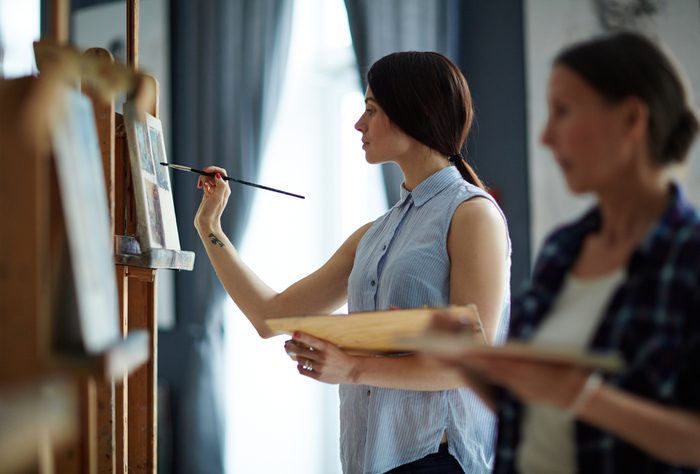
You still hang out with your childhood bestie
If you don’t have a list of old pals, you can still make friends as an adult. But having a series of close, long-lasting relationships—whether you take a yearly trip with your old college roommates or have regular chats with your best friend from childhood—says good things about your parenting potential, says Alisa Ruby Bash, PsyD, a licensed marriage and family therapist in Malibu. When it comes to raising kids, their relationship with you will be one of the most significant of their entire life so it’s critical you know how to maintain relationships, especially as circumstances change over time. “People with long-term friendships understand emotional intimacy,” she explains. “Their word means something and they show up when they commit to things and to people, something that will mean so much to a child.”

You’ve got a solid work resume
Surprisingly, many of the same skills that make someone a good employee translate into parenting, Dr. Bash says. (Like these soft skills that are increasingly in demand.) Holding down a job for several years and advancing in your career shows that you know how to be reliable, consistent, and are a problem-solver—all things that will come in handy with kids. “Parenting a child well is the hardest and most important job in the world,” Dr. Bash says. “There are no days off when you are a parent. You have to show up for the job every day, and everything you do determines your child’s psychological development.”

You’re good with customer service reps
We’ve all been in situations that make us want to explode—say, spending two hours on the phone with a new customer service rep to fix an error on your phone bill—but being able to stay calm and still be kind to the person on the other end of the line shows you have great emotional intelligence, a vital skill for parents. “Parents must have solid control over their emotions, know how to manage their feelings, and not just react with anger when things don’t work out the way they had wished,” she explains. “Having control over your emotions is so important since kids will push all your buttons like they have never been pushed. Acting out from an emotionally immature place will have lasting effects on your child.” Plus, being patient is good for you. Check out these 8 ways patience improves your health.

You get lost in a good novel
Being able to truly see the world through someone else’s eyes and be open to their perspective even if it’s radically different from yours—the way you do when you get absorbed into a novel or a biography—is an important and often underrated parenting skill, says Mayra Mendez, PhD, a licensed psychotherapist and program coordinator at Providence Saint John’s Child and Family Development Center in Santa Monica, California. “Good parents demonstrate the ability to take on the perspective of others and consider alternative realities beyond their own,” she adds.

You’ve said “no thanks” to an extra work project and taken a spa day instead
If you think finding balance in your life is hard now, just wait until you add a couple of kids to the mix, says Rachel Christie, an early childhood educator, family empowerment coach, and founder of Zen Mamma. Saying “yes” to one thing (like a work assignment) automatically means saying “no” to everything else (like your child’s school play), so knowing how to say no, kindly but firmly, is a sign you will be good at balancing life with kids. “This not only means finding balance between nutritious meals and treats, or homework and fun, but also balance between taking care of your children and taking care of yourself,” she says. “Parents must fill their own cups, so to speak, in order to have the energy and patience to take care of their children in a fun, joyful, and loving way. Fill your own cup up so much it spills over, and give from the saucer.”

You post pictures of birds and flowers on social media
Knowing how to look for and find joy in the little things in life—whether that’s fireflies during a sunset walk or breathing in the scent of fresh-cut grass—is the foundation of happy parenting, Christie says. “Having the ability to find joy in the little things, such as witnessing your child smiling in their sleep, or their excitement as they’re building a tower out of blocks, makes parenting that much more sacred and enjoyable,” she says, “especially when there is a sink full of dirty dishes, toys needing to be picked up, and a pile of laundry waiting to be washed.” These are some of the simple pleasures that make life worth living.

You’ve gone through therapy
Gone are the days when therapy was seen as something only “crazy” people needed; these days everyone can benefit from a mental tune-up. (These are the 9 signs you might need therapy now.) And taking care of your own problems now, before you have a baby, shows that you’re mature enough to consider it. Too many people see having a baby as a way to escape or fix their problems, but it’s not your child’s job to take care of your needs; it should be the other way around, Christie explains. “A child is a blessing and a beautiful addition to your life, not a magical solution to a problem. The additional responsibility of raising a child will only amplify any existing problem, not fix it,” she says.

You teach a weekend art class
Whether your passion is painting or car engines, knowing how to effectively share that with others and teach them how to do it is a sign you’ll be a good parent someday, Christie says. “Parents are a child’s first teachers,” she says. “Enjoying taking on this role as a teacher and guide to your child creates a safe atmosphere for them to try new things, make mistakes, and to become a lifelong learner.”

You’re the one your friends call to vent
Being a good listener is a skill that will help you in all avenues of your life and parenting is no exception, says Linda S. Lucas, PhD, a child psychologist at Beacon College in Leesburg, Florida. Listening with an empathetic ear is as important to children as it is to adults and they have a great radar for knowing when you’re truly tuned in or are only listening with one ear. “More than almost anything, children need to be listened to,” she says. In case you’re not sure how great your listening skills are, check out these 7 tell-tale signs you’re a bad listener.

You let someone with a few items jump ahead of you in line at the store
If there’s one trait that describes parenting more than any other it’s “self-sacrifice.” Parents need to be willing to put their children’s needs above their own, even when it’s difficult, painful, boring, or inconvenient, Dr. Lucas says. “If a person is self-absorbed, he or she likely will not exhibit the sacrificial qualities needed to raise children and may lack the sensitivity needed in a child’s developmental process,” she explains. So if you’re the type of person who is happy to help an elderly neighbor, organize the office toy drive, pay for a stranger’s coffee, or otherwise give up your resources to help another, you’re going to be a great parent.

You wear a bikini with pride, cellulite be darned
“Shaming of mothers has become an unfortunate reality in our society,” Christie says, which is why it’s so important to have a healthy self-esteem. Parents who are able to trust themselves and be forgiving of their flaws (and others’) will instill that same confidence in their children. Plus, self-confidence will come in handy for shutting down all the random advice and opinions people will start giving you the second they hear you’re going to have a baby. “It’s important to trust in your own choices and intuition when it comes to your child, because no one knows your child, their needs and their interests better than you,” she adds. Not naturally confident? Try these 30 tricks to instantly boost your confidence.
